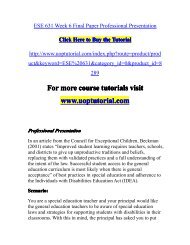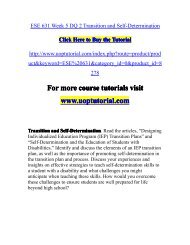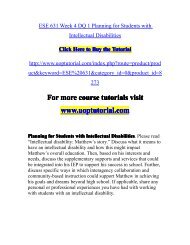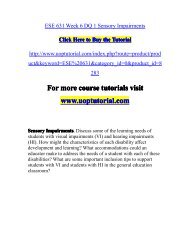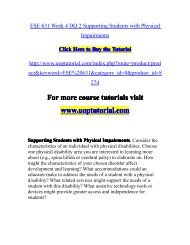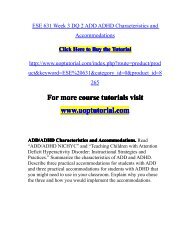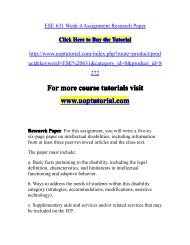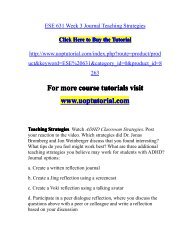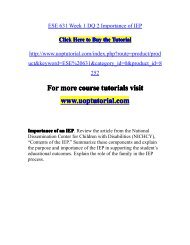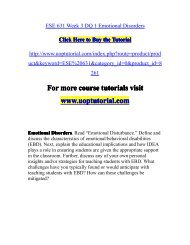ENV 322 ENTIRE COURSE
- No tags were found...
You also want an ePaper? Increase the reach of your titles
YUMPU automatically turns print PDFs into web optimized ePapers that Google loves.
<strong>ENV</strong> <strong>322</strong> <strong>ENTIRE</strong> <strong>COURSE</strong><br />
Click Here to Buy the Tutorial<br />
http://www.uoptutorial.com/index.php?route=product/prod<br />
uct&keyword=<strong>ENV</strong>%20<strong>322</strong>&category_id=0&product_id=<br />
8244<br />
For more course tutorials visit<br />
www.uoptutorial<br />
tutorial.com<br />
Gaia Hypothesis. In Chapter 3, the Gaia hypothesis is introduced.<br />
It addresses two hypotheses; (1) life, since its inception, has greatly<br />
affected the planetary environment and (2) life has altered Earth’s<br />
environment in ways that have allowed life to persist. Do you<br />
agree with these two hypotheses? Why or why not?<br />
Energy and Food Supplies. The underlying theme of this course<br />
is energy. As a whole, the global society needs to find ways to<br />
reduce our energy consumption. The food pyramid is a prime<br />
example of energy transfer within individual ecosystems and the<br />
biosphere. As you increase the trophic levels, a greater amount of<br />
energy is lost. Some environmentalists argue that humans should<br />
eat a vegetarian diet in order to conserve energy.<br />
What are some of the pros and cons of this action? Consider the<br />
impact to the agricultural industry? How low on the food chain do<br />
you eat? Would you consider eating lower?
Model Ecosystems. Review the virtual lab in Model Ecosystems.<br />
Within this laboratory exercise you will categorize various<br />
organisms into the correct trophic level for five different<br />
ecosystems. Once completed, you will calculate the amount of<br />
energy transferred between levels. Record your observations.<br />
Answer the journal questions and upload it as a Word document<br />
into the online course.<br />
Energy Policy. The U.S. Energy Policy is currently being<br />
reviewed and six main recommendations are listed, by Botkin and<br />
Keller (2011, p. 298). Discuss whether or not each<br />
recommendation will lead us to a sustainable society. Defend your<br />
position by discussing the benefits and drawbacks. Provide<br />
substantive evidence from outside sources if necessary.<br />
Fossil Fuel Reserves. Fossil fuels reserves are rapidly depleting in<br />
the United States. The oil industry is lobbying the United States<br />
government to grant permission to allow drilling in several<br />
untapped areas. Select one of the areas below and discuss whether<br />
you believe that government should be allowed to drill for oil.<br />
Include the environmental and economic viewpoints. Support your<br />
position with scholarly resources.<br />
a. Wildlife refuges/National parks (example ANWR)<br />
b. Offshore drilling<br />
Final Research Paper Outline. Review the Final Research Paper<br />
instructions in Week Five of the online course or in the<br />
Components of Course Evaluation section of the course guide.<br />
Submit an outline of the Final Research Paper.<br />
Nuclear Energy. Based on your readings, do you believe that the<br />
Unites States should increase the use of nuclear energy, a
non-renewable resource, as a replacement for fossil fuels? Defend<br />
your answer by discussing the pros and cons of nuclear energy.<br />
When answering, be sure to address the following (a) mining of<br />
uranium, (b) safety, (c) environmental impacts, and (d) waste<br />
disposal<br />
Nuclear Waste Disposal. One of the most controversial issues<br />
when discussing the possibility of nuclear power as an energy<br />
source is the disposal of the spent fuel rods. Yucca Mountain, the<br />
main proposed repository, has been studied for consideration for<br />
over ten years. What geological features of Yucca Mountain made<br />
it a potential waste site? What were the drawbacks of this location?<br />
Since President Obama took office, he has halted funding for the<br />
development of Yucca Mountain. What impact will this have on<br />
utilizing nuclear waste since an alternate waste site has not been<br />
selected? Is it a good idea to have all of the nation’s waste in one<br />
location or should it be spread out over several locations?<br />
Non-renewable Energy Sources. Energy generation is an ongoing<br />
topic in the United States and worldwide. Historically, the nation’s<br />
main energy source is fossil fuels. However, nuclear power has<br />
also contributed throughout history. These energy sources are<br />
considered non-renewable resources because their inputs are<br />
limited in both quantity and availability. Select either fossil fuel<br />
energy or nuclear power as the main topic for this paper. Discuss<br />
the impact that the selected source has had on the environment.<br />
Additionally, select one environmental disaster that has occurred<br />
because of your selected fuel source and describe the disaster in<br />
detail. (a) What, specifically, occurred? (b)What were the<br />
ecological and human health effects? (c) How was the disaster<br />
handled? (d) And, what did we learn from it? If applicable, discuss<br />
what environmental policies were established because of the<br />
selected disaster.<br />
Alternative Energy Sources and Your Local Ecosystem. During
this week’s readings, you have learned about numerous types of<br />
alternative energy sources. Each energy source has its advantages<br />
and disadvantages. Geography often determines which of these<br />
sources will be the most useful in a given area. Consider your local<br />
ecosystem. Which alternative energy source would be the most<br />
compatible with your area? Provide a comprehensive explanation<br />
as to why it would be the most successful. Also, discuss why two<br />
other sources would not be beneficial in your area.<br />
Unorthodox Energy Sources. Throughout the text, mainstream<br />
energy sources are discussed. One of the factors that set humans<br />
apart from any other species is the ability to think critically and<br />
develop new and innovative ideas to solve environmental problems.<br />
After reading the article by Meg Carter, discuss some of the<br />
practical applications of non-mainstream (i.e., human power)<br />
energy sources. Do you believe that these are viable energy options<br />
in large scale operations? Small scale operations? Discuss one<br />
other non-mainstream option that may have practicality in energy<br />
production? (Hint<br />
Hint: If you are unable to find any via the Internet,<br />
look at the recommended readings).<br />
How Big is Your Footprint. You will be the energy manager for a<br />
large business. You will determine the mix of solar, wind, coal, and<br />
gas that will not only provide ample energy, but keep your<br />
footprint low. You will also attempt to find the proper mix of<br />
energy at a low cost. Visit How Big Is Your Footprint? Discovery<br />
Education Player and follow the instructions below:<br />
1. Read instructions and then enter your name when prompted.<br />
2. Select Level 1.<br />
3. Read the directions (You do not need to plan your investigation<br />
or get approval ahead of time.) and then begin attempting to find<br />
the right mix. Your results will be recorded in the results table.<br />
Perform the test at least ten times using different combinations.
4. Copy and paste this table.<br />
5. Close the window and follow Steps 1 and 2 again.<br />
6. Select Level 2.<br />
7. Read the directions (You do not need to plan your investigation<br />
or get approval ahead of time.) and attempt to find the right mix of<br />
energy, light bulbs, and costs. Perform this exercise at least ten<br />
times using different combinations.<br />
8. Copy and paste this table.<br />
9. Answer the following questions based on your results of the two<br />
levels and upload it as a Word document into your online course.<br />
LEVEL 1<br />
a. Which combination of energy sources provided the smallest<br />
carbon footprint? Does this support what you have learned<br />
throughout this course?<br />
b. Which combination provided a small footprint and a small cost?<br />
Defend your answer.<br />
LEVEL 2<br />
a. Which combination of energy sources coupled with the amount<br />
of light bulbs, provided the smallest cost per month? Does this<br />
support what you have learned throughout this course? Defend<br />
your answer.<br />
Energy Consumption. Reducing our energy consumption is vital<br />
in our quest to preserve the environment. The conversion from<br />
fossil fuels to renewable energy sources will not happen overnight.<br />
In the meantime, individuals and businesses can decrease their<br />
dependence on fossil fuels by following several simple ideas. After
eading The Energy Savers Booklet, what areas of energy<br />
conservation do you already employ? In what areas do you need to<br />
improve? Explain your answers, in detail.<br />
Voluntary vs. Regulatory Involvement. Affluence leads to<br />
overconsumption and increased waste. Governments, industries,<br />
and individuals have contributed to the lack of environmental<br />
sustainability. Actions must be taken immediately to alter our<br />
wasteful ways. The government has developed programs to help<br />
reduce energy consumption. However, the majority of these<br />
programs are voluntary, such as the Energy Star Program. Should<br />
the government continue to develop voluntary programs or do<br />
more drastic actions employing regulations that enforce<br />
compliance of governments, industries, and individuals be<br />
instituted? Defend your answer.<br />
Focus of the Final Paper<br />
Energy is defined as the ability to do work. Over the duration of<br />
this course, you will come to differentiate between nonrenewable<br />
and renewable energy sources.<br />
For the Final Research Paper, you will need to:<br />
1. Select an energy source from the list below.<br />
a. Fossil fuels<br />
b. Nuclear power<br />
c. Solar power<br />
d. Wind power<br />
e. Hydroelectric power<br />
f. Geothermal power
g. Biofuels/Biomass energy<br />
h. Hydrogen power<br />
2. Discuss the components associated with your energy source.<br />
3. Compare and contrast the benefits and drawbacks in relationship<br />
to the environment and the economic market.<br />
4. Discuss the long-term availability and successfulness of this<br />
option.<br />
Analyze the impact that it has had or may have on the<br />
environment.




